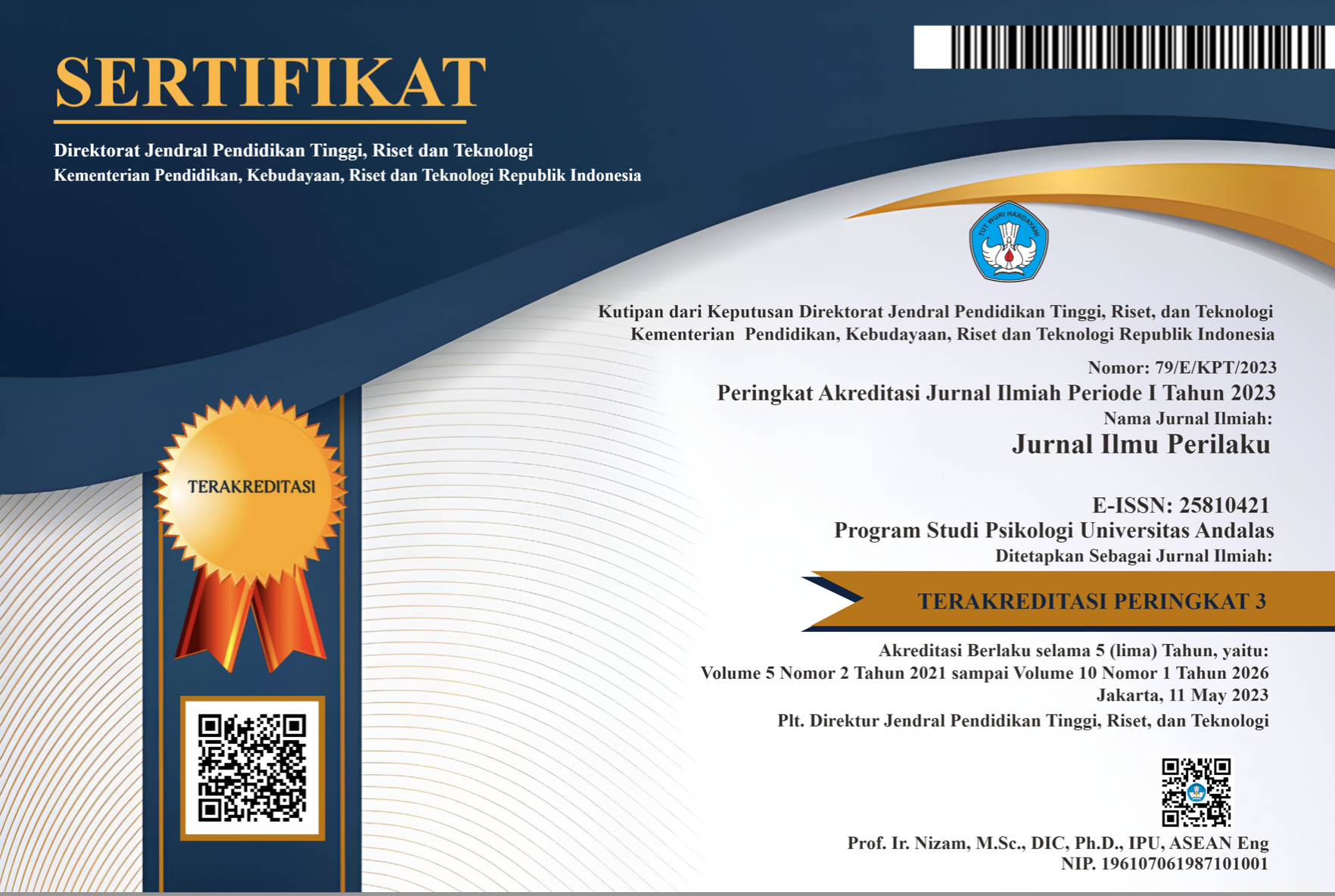Homesickness pada Siswa Baru di Pesantren : Bagaimana Peran Self Compassion dan Friendship Quality
Abstract
Boarding school is one of the oldest educational institutions in Indonesia that’s able to maintain its existence in this modern era. Homesickness is one of the most significant issues faced by students during their transition to boarding. This study aims to investigate the role of self- compassion and friendship quality on homesickness among first year boarding school students, involving 193 students of 7th grade aged 12-13 years in Medan, North Sumatera by using the cluster random sampling technique. Data analysis results by multiple regression explained that self-compassion and friendship quality has a significant effect on homesickness with an effective contribution of 24.9% and 75.1% influenced by other variables not examined in this study. Based on this research, it is concluded that developing self-compassion and friendship quality can help reduce homesickness among first year boarding school students.
Downloads
References
Bluth, K., & Blanton, P. W. (2015). The influence of self-compassion on emotional well-being among early and older adolescent males and females. Journal of Positive Psychology, 10(3). https://doi.org/10.1080/17439760.2014.936967
Demetriou, E. A., Boulton, K. A., Bowden, M. R., Thapa, R., & Guastella, A. J. (2022). An evaluation of homesickness in children: A systematic review and meta-analysis. Journal of Affective Disorders, 297. https://doi.org/10.1016/j.jad.2021.09.068
English, T., Davis, J., Wei, M., & Gross, J. J. (2017). Homesickness and adjustment across the first year of college: A longitudinal study. Emotion, 17(1). https://doi.org/10.1037/emo0000235
Ferrari, M., Hunt, C., Harrysunker, A., Abbott, M. J., Beath, A. P., & Einstein, D. A. (2019). Self-Compassion Interventions and Psychosocial Outcomes: a Meta-Analysis of RCTs. Mindfulness, 10(8). https://doi.org/10.1007/s12671-019-01134-6
Fisher, S. (2016). Homesickness, cognition and health. In Homesickness, Cognition and Health. Lawrence Erlbaum Associates, Ltd. https://doi.org/10.4324/9781315636900
Flynn, H. (2018). Friendships of Adolescence. In The Blackwell Encyclopedia of Sociology. John Wiley & Sons, Ltd. https://doi.org/10.1002/9781405165518
Freitas, M., Santos, A. J., Ribeiro, O., Pimenta, M., & Rubin, K. H. (2018). Friendship quality in adolescence and social adjustment in the peer group. Analise Psicologica, 36(2). https://doi.org/10.14417/ap.1551
Hack-Polay, D. (2012). When Home Isn’t Home – A Study of Homesickness and Coping Strategies among Migrant Workers and Expatriates. International Journal of Psychological Studies, 4(3). https://doi.org/10.5539/ijps.v4n3p62
Hendrickson, B., Rosen, D., & Aune, R. K. (2011). An analysis of friendship networks, social connectedness, homesickness, and satisfaction levels of international students. International Journal of Intercultural Relations, 35(3), 281–295. https://doi.org/10.1016/j.ijintrel.2010.08.001
Ikromi, Z. A., Diponegoro, A. M., & Tentama, F. (2019). Faktor psikologis yang mempengaruhi subjective well-being pada remaja yang tinggal di pondok pesantren. Prosiding Seminar Nasional Magister Psikologi Universitas Ahmad Dahlan, 412–420.
Játiva, R., & Cerezo, M. A. (2014). The mediating role of self-compassion in the relationship between victimization and psychological maladjustment in a sample of adolescents. Child Abuse and Neglect, 38(7). https://doi.org/10.1016/j.chiabu.2014.04.005
Kemenag. (2022). Statistik Pesantren. https://ditpdpontren.kemenag.go.id/pdpp
Kholilah, K., & Baidun, A. (2020). Pengaruh Quality of Friendship dan Subjective Well Being terhadap Hardiness Santri Pondok Pesantren Modern Al Amanah Al Gontory. TAZKIYA: Journal of Psychology, 8(1). https://doi.org/10.15408/tazkiya.v7i1.11159
Krejcie, R. V., & Morgan, D. W. (1970). Determining Sample Size for Research Activities. Educational and Psychological Measurement, 30(3). https://doi.org/10.1177/001316447003000308
Mariska, A. (2018). Pengaruh Penyesuaian Diri Dan Kematangan Emosi Terhadap Homesickness. Psiko Borneo, 6(3), 670–680.
Neff, K. (2003). The Development and Validation of a Scale to Measure Self-Compassion. Self and Identity, 12(3), 278–290. https://doi.org/10.1080/15298860309027
Neff, K. (2011). Self Compassion: The Proven Power of Being Kind to Yourself. In Harper Collins Publisher. William Morrow.
Niziurski, J. A., & Berntsen, D. (2019). Involuntary Versus Voluntary Episodic Memories: The Effects of Encoding Factors and Emotion. Psychology of Consciousness: Theory Research, and Practice. https://doi.org/10.1037/cns0000190
Ojanen, T., Sijtsema, J. J., Hawley, P. H., & Little, T. D. (2010). Intrinsic and extrinsic motivation in early adolescents’ friendship development: Friendship selection, influence, and prospective friendship quality. Journal of Adolescence, 33(6). https://doi.org/10.1016/j.adolescence.2010.08.004
Rahmayanti, F., Sugiharto, D. Y. P., & Sunawan. (2019). The Effect of Social Adjustment Mediation on Relationships Homesickness with The Happiness. Jurnal Bimbingan Konseling, 2(943–957).
Santrock, J. W. (2002). Adolescents. Perkembangan Masa Hidup. Erlangga.
Stroebe, M., Schut, H., & Nauta, M. (2015). Homesickness: A systematic review of the scientific literature. Review of General Psychology, 19(2), 1–15. https://doi.org/http://dx.doi.org/10.1037/gpr0000037
Stroebe, M., Van Vliet, T., Hewstone, M., & Willis, H. (2002). Homesickness among students in two cultures: Antecedents and consequences. British Journal of Psychology, 93(2), 147–168. https://doi.org/10.1348/000712602162508
Sun, J., Hagedorn, L., & Zhang, Y. L. (2016). Development Homesickness at college: Its impact on academic performance and retention. Journal of College Student Development, 57(8), 943–957. https://doi.org/10.1353/csd.2016.0092
Sünbül, Z. A., & Çekici, F. (2018). Homesickness in the first year college students: The role of personality and attachment styles. International Journal of Social Sciences and Education Research, 4(3), 412–420. https://doi.org/10.24289/ijsser.426764
Terry, M. L., Leary, M. R., & Mehta, S. (2013). Self-compassion as a Buffer against Homesickness, Depression, and Dissatisfaction in the Transition to College. Self and Identity, 12(3), 278–290. https://doi.org/10.1080/15298868.2012.667913
Thien, L. M., Razak, N. A., & Jamil, H. (2012). Friendship Quality Scale : Conceptualization, Development and Validation. AARE APERA International Conference.
Thomas, D. (2018). Factors that contribute to homesickness among students in Thailand. Kasetsart Journal of Social Sciences, 1–6. https://doi.org/10.1016/j.kjss.2018.07.011
Thurber, C. A., Walton, E., Murray, R. D., Frankowski, B. L., Gereige, R. S., Mears, C. J., Roland, M. M., Young, T. L., Grant, L. M., Hyman, D., Magalnick, H., Monteverdi, G. J., Pattishall, E. G., LaCursia, N., Mazyck, D., Vernon-Smiley, M., Wallace, R., & Li, S. (2007). Preventing and treating homesickness. American Academy of Pediatrics, 119(1), 1–11. https://doi.org/10.1542/peds.2006-2781
Urani, M. A., Miller, S. A., Johnson, J. E., & Petzel, T. P. (2003). Homesickness in Socially Anxious First Year College Students. College Student Journal, 37(3).
Yasmin, M., & Daulay, D. A. (2017). Gambaran Homesickness pada Siswa Baru di Lingkungan Pesantren. Psikologia: Jurnal Pemikiran Dan Penelitian Psikologi, 12(3), 165–173. https://doi.org/10.32734/psikologia.v12i3.2260
Zulkarnain, Daulay, D. A., Yusuf, E. A., & Yasmin, M. (2019). Homesickness, locus of control and social support among first-year boarding-school students. Psychology in Russia: State of the Art, 12(2), 134–145. https://doi.org/10.11621/pir.2019.0210
The non-commercial use of the article is governed by the Creative Commons Attribution license as currently displayed on Creative Commons Attribution-NonCommercial-ShareAlike 4.0 International License.
JIP's spirit is to disseminate articles published are as free as possible. Under the Creative Commons license, JIP permits users to copy, distribute, display, and perform the work for non-commercial purposes only. Users will also need to attribute authors and JIP on distributing works in the journal.
Please find the rights and licenses in Jurnal Ilmu Perilaku (JIP).
- License
The non-commercial use of the article will be governed by the Creative Commons Attribution license as currently displayed on Creative Commons Attribution-NonCommercial-ShareAlike 4.0 International License.
- Author’s Warranties
The author warrants that the article is original, written by stated author(s), has not been published before, contains no unlawful statements, does not infringe the rights of others, is subject to copyright that is vested exclusively in the author and free of any third party rights, and that any necessary written permissions to quote from other sources have been obtained by the author(s).
- User Rights
JIP's spirit is to disseminate articles published are as free as possible. Under the Creative Commons license, JIP permits users to copy, distribute, display, and perform the work for non-commercial purposes only. Users will also need to attribute authors and JIP on distributing works in the journal.
- Rights of Authors
Authors retain the following rights:
- Copyright, and other proprietary rights relating to the article, such as patent rights,
- The right to use the substance of the article in future own works, including lectures and books,
- The right to reproduce the article for own purposes, provided the copies are not offered for sale,
- The right to self-archive the article.
- Co-Authorship
If the article was jointly prepared by other authors, the signatory of this form warrants that he/she has been authorized by all co-authors to sign this agreement on their behalf, and agrees to inform his/her co-authors of the terms of this agreement.
- Termination
This agreement can be terminated by the author or JIP upon two months’ notice where the other party has materially breached this agreement and failed to remedy such breach within a month of being given the terminating party’s notice requesting such breach to be remedied. No breach or violation of this agreement will cause this agreement or any license granted in it to terminate automatically or affect the definition of JIP.
- Royalties
This agreement entitles the author to no royalties or other fees. To such extent as legally permissible, the author waives his or her right to collect royalties relative to the article in respect of any use of the article by JIP or its sublicensee.
- Miscellaneous
JIP will publish the article (or have it published) in the journal if the article’s editorial process is successfully completed and JIP or its sublicensee has become obligated to have the article published. JIP may conform the article to a style of punctuation, spelling, capitalization, referencing and usage that it deems appropriate. The author acknowledges that the article may be published so that it will be publicly accessible and such access will be free of charge for the readers.










